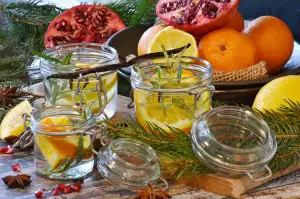Rust-Busting Magic: Your Ultimate Guide to Cleaning Rusty Cast Iron at Home

- Gather materials: white vinegar, baking soda, steel wool, dish soap, cloth, vegetable oil.
- Scrub the rust: Mix vinegar and baking soda into a paste, apply to rust spots, scrub with steel wool.
- Rinse and dry: Wash the cast iron with dish soap and water, dry thoroughly.
- Season the cast iron: Apply a thin layer of vegetable oil, bake in the oven at 350°F for an hour.
- Store properly: Store cast iron in a dry place to prevent rusting in the future.
Gather materials: white vinegar, baking soda, steel wool, dish soap, cloth, vegetable oil.
To begin the rust-busting process for your cast iron cookware, you will need to gather a few essential materials. Make sure you have white vinegar, baking soda, steel wool, dish soap, a cloth, and vegetable oil on hand. These items will help you effectively remove rust from your cast iron and restore it to its former glory.
Scrub the rust: Mix vinegar and baking soda into a paste, apply to rust spots, scrub with steel wool.
To tackle the stubborn rust on your cast iron, start by creating a powerful cleaning paste. Mix equal parts of white vinegar and baking soda until it forms a thick paste. Apply this paste generously onto the rusty areas of the cast iron, ensuring that all rust spots are well-covered. Then, take a piece of steel wool and begin scrubbing the affected areas with firm yet gentle pressure. The abrasive nature of the steel wool combined with the acidic properties of the vinegar will work together to break down and remove the rust effectively. Be patient and thorough in this step to ensure that all traces of rust are lifted from the surface of your cast iron cookware.
Rinse and dry: Wash the cast iron with dish soap and water, dry thoroughly.
After scrubbing the rust off your cast iron using the vinegar and baking soda paste, it's important to thoroughly rinse and dry the cookware. Wash the cast iron with a mild dish soap and warm water to remove any remaining residue. Be sure to dry the cast iron completely using a clean cloth or paper towel to prevent any moisture from causing new rust spots to form. Proper drying is crucial in maintaining the integrity of your cast iron cookware and preventing future rusting issues.
Season the cast iron: Apply a thin layer of vegetable oil, bake in the oven at 350°F for an hour.
Seasoning your cast iron cookware is the key to maintaining its non-stick surface and preventing rust. After cleaning off the rust, it's time to season your cast iron. Start by applying a thin layer of vegetable oil all over the surface of the cookware, including the handle and exterior. Make sure to use an oil with a high smoke point like flaxseed or grapeseed oil for best results.
Preheat your oven to 350°F (177°C) and place your oiled cast iron upside down on the middle rack. This allows any excess oil to drip off during baking. Bake the cookware for one hour, then turn off the oven and let it cool completely inside before removing.
The heat helps bond the oil to the metal, creating a natural non-stick coating called seasoning. The more you use and season your cast iron, the better it becomes. Repeat this process regularly to maintain a well-seasoned surface that will resist rust and provide excellent cooking performance for years to come.
Store properly: Store cast iron in a dry place to prevent rusting in the future.
To ensure your cast iron stays rust-free in the future, proper storage is key. After cleaning and seasoning your cast iron cookware, store it in a dry place. Moisture is the enemy of cast iron as it can lead to rust formation. To prevent this, make sure your cast iron is completely dry before storing it. You can even place a paper towel inside the cookware to absorb any excess moisture that may be present. By keeping your cast iron in a dry environment, you'll help maintain its seasoned surface and prolong its lifespan for years to come.
Published: 10. 05. 2024
Category: Home



